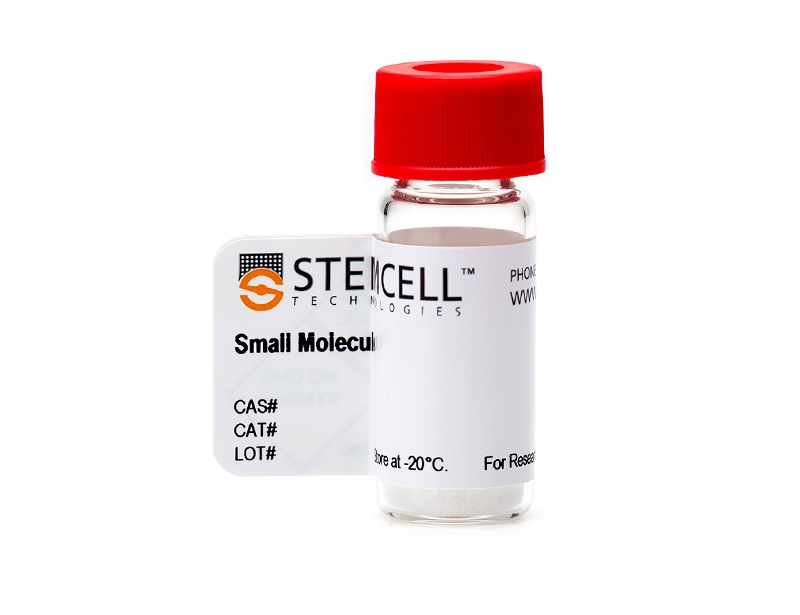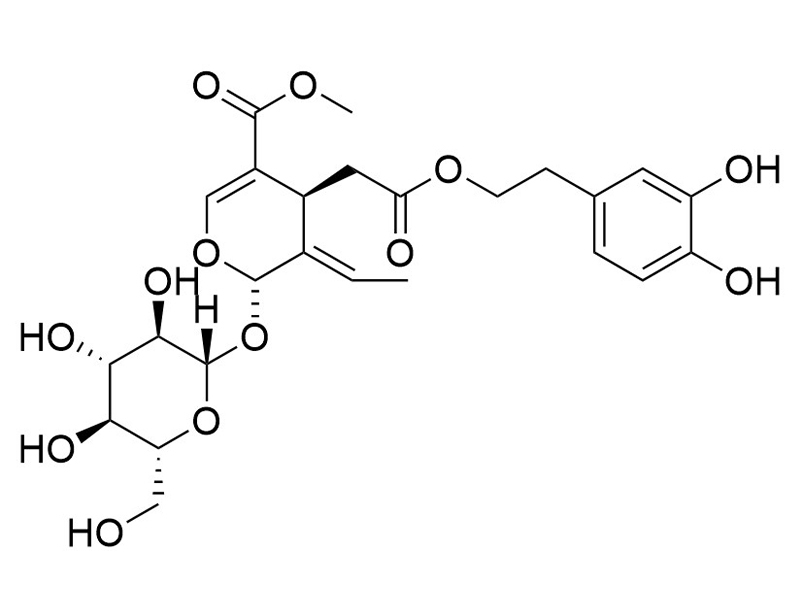概要
Oleuropein is the primary phenolic compound found in olives and olive oil, and it exhibits antioxidant, anti-inflammatory, and anti-cancer properties (Sun et al.).
DIFFERENTIATION
· Decreases adipocyte differentiation and increases osteoblast differentiation in mesenchymal stem cells (Santiago-Mora et al.).
CANCER RESEARCH
· Inhibits proliferation and induces apoptosis in MCF-7 human breast cancer cells (Han et al.).
DIFFERENTIATION
· Decreases adipocyte differentiation and increases osteoblast differentiation in mesenchymal stem cells (Santiago-Mora et al.).
CANCER RESEARCH
· Inhibits proliferation and induces apoptosis in MCF-7 human breast cancer cells (Han et al.).
技术资料
| Document Type | 产品名称 | Catalog # | Lot # | 语言 |
|---|---|---|---|---|
| Product Information Sheet | Oleuropein | 100-0256, 100-0258 | All | English |
| Safety Data Sheet | Oleuropein | 100-0256, 100-0258 | All | English |
数据及文献
Publications (3)
Oncotarget 2017 mar
Oleuropein, unexpected benefits!
Abstract
Abstract
Osteoporosis international : a journal established as result of cooperation between the European Foundation for Osteoporosis and the National Osteoporosis Foundation of the USA 2011 feb
Oleuropein enhances osteoblastogenesis and inhibits adipogenesis: the effect on differentiation in stem cells derived from bone marrow.
Abstract
Abstract
UNLABELLED The effects of oleuropein on the processes of osteoblastogenesis and adipogenesis in mesenchymal stem cells (MSCs) from human bone marrow have been studied. We report that oleuropein, a polyphenol abundant in olive tree products, reduces the expression of peroxisome proliferator-activated receptor gamma (PPAR$\gamma$), inhibits adipocyte differentiation, and enhances differentiation into osteoblast. INTRODUCTION Age-related bone loss is associated with osteoblast insufficiency during continuous bone remodeling. It has been suggested that the formation of osteoblasts in bone marrow is closely associated with adipogenesis, and age-related changes in this relationship could be responsible for the progressive adiposity of bone marrow which occurs with osteoporosis. In addition, the consumption of oleuropein, a major polyphenol in olive leaves and olive oil, has been associated with a reduction in bone loss. METHODS We have analyzed the effects of oleuropein-at concentrations between 10(-6) and 10(-4) M-on the processes of osteoblastogenesis and adipogenesis in MSCs from human bone marrow. RESULTS The results show an increase in osteoblast differentiation and a decrease in adipocyte differentiation when there is oleuropein in the culture media. The gene expression of osteoblastogenesis markers, RUNXII, osterix, collagen type I, osteocalcin, or alkaline phosphatase (ALP), was higher in osteoblast-induced oleuropein-treated cells. Also, the ALP activity and extracellular matrix mineralization were higher when oleuropein was present in the media. Oleuropein in MSCs induced adipocytes to produce a decrease in the expression of the genes involved in adipogenesis, the PPAR$\gamma$, lipoprotein lipase, or fatty acid-binding protein 4, and minor fat accumulation. CONCLUSION Our data suggest that oleuropein, highly abundant in olive tree products included in the traditional Mediterranean diet, could prevent age-related bone loss and osteoporosis.
Cytotechnology 2009 jan
Anti-proliferative and apoptotic effects of oleuropein and hydroxytyrosol on human breast cancer MCF-7 cells.
Abstract
Abstract
Olive oil intake has been shown to induce significant levels of apoptosis in various cancer cells. These anti-cancer properties are thought to be mediated by phenolic compounds present in olive. These beneficial health effects of olive have been attributed, at least in part, to the presence of oleuropein and hydroxytyrosol. In this study, oleuropein and hydroxytyrosol, major phenolic compound of olive oil, was studied for its effects on growth in MCF-7 human breast cancer cells using assays for proliferation (MTT assay), cell viability (Guava ViaCount assay), cell apoptosis, cellcycle (flow cytometry). Oleuropein or hydroxytyrosol decreased cell viability, inhibited cell proliferation, and induced cell apoptosis in MCF-7 cells. Result of MTT assay showed that 200 mug/mL of oleuropein or 50 mug/mL of hydroxytyrosol remarkably reduced cell viability of MCF-7 cells. Oleuropein or hydroxytyrosol decrease of the number of MCF-7 cells by inhibiting the rate of cell proliferation and inducing cell apoptosis. Also hydroxytyrosol and oleuropein exhibited statistically significant block of G(1) to S phase transition manifested by the increase of cell number in G(0)/G(1) phase.

 网站首页
网站首页





